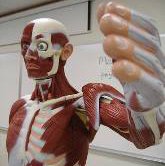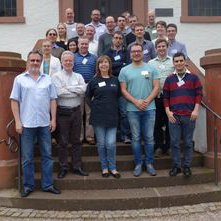Research IT News
Collaborations Workshop 2017 (CW17): The Internet of Things and Open Data


The Collaborations Workshop 2017 (CW17) is the Software Sustainability Institute’s research software event of 2017. It brings together key members of the research software community to present, discuss, build, make, network and explore key and current areas of the research software landscape. Many RSE groups will have representatives attending.
Introduction to Avizo January 2017


An Avizo Introduction course will be running at the University of Manchester on Thursday, 26th January. Avizo is 3D visualization and analysis software for scientific data.
Research IT Hitting the Headlines with Linguasnapp


A mobile phone app developed by Research IT has been hitting the headlines recently. Featured on ITV news and Granada Reports as well as in The Daily Mirror, the Manchester Evening News and local newspapers across the region, Linguasnapp is enabling researchers to identify the range of languages used in Manchester.
Research Data Storage Upgrade


The Research Data Storage (Isilon) is being upgraded to a new tiered platform which will offer greater data storage capacity. Preparatory work for the upgrade is underway and this will require Isilon to be unavailable on Saturday 10th December from 6am - 2pm.
Research IT Drop In Sessions 2017


Thank you to everyone who came to one of our Drop-in sessions over the last month. It's been great to hear about your projects and see how Research IT might be able to support your research.
Parallel Programming with C++


There will be a half day course on "Parallel Programming with C++" at the University on the 24th of January 2017. This is a short course that will give you a taste of functional programming in C++ and how it can be used to write efficient parallel code.
Centre for Musculoskeletal Research Launch Study Catalogue


Our Research software engineers (RSEs) are helping researchers in the Centre for Musculoskeletal Research launch a tool for sharing best practice in study design and management. The Extant Study Catalogue will allow researchers at Manchester and further afield to share details of their study design, datasets and coding practices, with a view to developing a shared data dictionary that can be used to make studies more easily comparable.
Research IT Club Presentations Out Now!


The presentations from the first meeting of the Research IT club are now available online. They include an introduction to Research IT and research infrastructure, a presentation on how Research IT have helped to speed up proteomics research and an overview of the new Dropbox for Business service.
New Starters in Research IT


We have recently welcomed two new members of staff to the Research IT team. Jim McGrath and David Mawdsley have both joined as Research Software Engineers.
Research IT Contributes to Academic Software Report


Robert Haines from Research IT recently attended the Dagstuhl Perspectives Workshop 'Engineering Academic Software', co-organised by the Software Sustainability Institute's Manchester PI Carole Goble. The primary topics of discussion at the workshop were how to build the research software of the future and how to get credit for doing so.
R at University of Manchester


The second meeting of the University of Manchester R user group (R.U.M) will take place on the 5th December, at 11:00am-12pm in Vaughan House. Paul Johnston from Research IT will be presenting on ‘Text mining in R’ and Heather Robinson from Health e-Research Centre (HeRC) will discuss ‘Enhancing your research with public datasets- an introduction to WORLDCLIM’. The session will be followed by a R clinic for troubleshooting problem code.
NAG Numerical & Statistical Routines within MATLAB


NAG (The Numerical Algorithms Group) are running a training session on how to make the most of their numerical and statistical routines within MATLAB. The NAG Library, and Fortran Compiler, are available to University of Manchester staff and students for use on both institutional and personal machines for academic use under a site-wide license.
